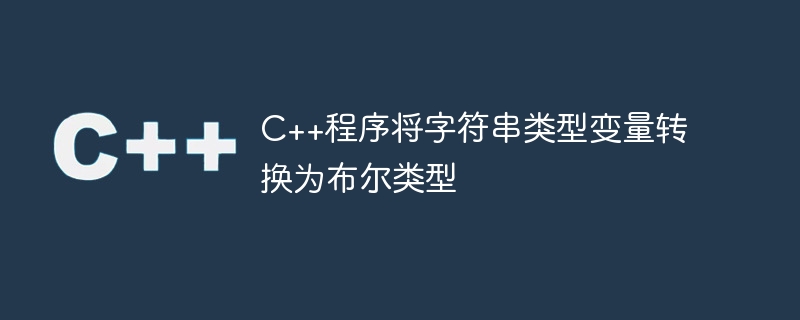

In C, Boolean variables consist of binary data true or false, and string variables are sequences of letters, numbers, and special characters. The compiler itself cannot convert a string to a boolean, but there are several ways to perform this conversion. We explore various methods of converting string values to Boolean values.
If we think about the algorithm, it's pretty simple. We take a string value and convert it to a boolean value using various means.
Boolalpha is a stream I/O manipulator that can be used to manipulate Boolean and alphanumeric values. Istringstream is a string stream used to implement different functions on character streams. Since boolalpha works with streams, it can be used with isringstream to convert string values to boolean values.
string ip = <string literal>; bool op; istringstream(ip) >> std::boolalpha >> op;
#include <iostream>
#include<sstream>
using namespace std;
bool solve(string ip) {
bool op;
istringstream(ip) >> std::boolalpha >> op;
return op;
}
int main()
{
string ip = "true";
bool op = solve(ip);
cout << "The value of ip is: " << ip <<endl;
cout << "The value of op is: " << op <<endl;
return 0;
}
The value of ip is: true The value of op is: 1
In this example, we take a string value as input. We then use an isringstream object to contain the string value and then use the boolalpha modifier to convert it to a boolean variable. We print the input and output values for comparison.
In the next example, we have done a basic string comparison to convert a string value into a Boolean value. If the string value is equal to 'false', then 0 is returned; otherwise, 1 is returned. One thing is to be noted that this returns true for all strings other than 'false'. But this method is the easiest to implement.
string ip = <string literal>; bool op = ip != “false”;
#include <iostream>
using namespace std;
bool solve(string s) {
return s != "false";
}
using namespace std;
int main() {
string ip = "true";
bool op = solve(ip);
cout<< "The input value is: " << ip << endl;
cout<< "The output value is: " << op << endl;
return 0;
}
The input value is: true The output value is: 1
In the previous example, we only converted "true" to the Boolean value "1" and "false" to the Boolean value "0". Now, in some cases the string value may be 0 or 1. For this case, we can use the stoi function to convert the string value to an integer and then to a boolean value. The stoi function converts a string value to an integer and using explicit type conversion we can convert the value to a boolean value.
string ip = <string literal>; bool op = (bool)stoi(ip);
#include <iostream>
#include <string>
using namespace std;
bool solve(string s) {
//using std:: stoi function
return (bool)stoi(s);
}
using namespace std;
int main() {
string ip = "1";
bool op = solve(ip);
cout<< "The input value is: " << ip << endl;
cout<< "The output value is: " << op << endl;
return 0;
}
The input value is: 1 The output value is: 1
We take a string as input, which may contain any value "true", "1", "false" or "0". The first two methods convert "true" or "false" to 1 and 0 respectively. If we replace "true" or "false" with "1" or "0", it will work the same way. But in the third example, if we change '1' or '0' to 'true' or 'false', it will not work because stoi function cannot convert string that does not contain alphanumeric characters to integer value and therefore cannot be converted to a Boolean value. So, depending on the use case, we have to determine the best method to use.
When using certain third-party libraries or APIs in specific projects, string to Boolean conversion is required. Some APIs or libraries output in string format, in order to make the result compatible, we have to convert the string value to boolean value.
The above is the detailed content of C++ program to convert string type variable to boolean type. For more information, please follow other related articles on the PHP Chinese website!




